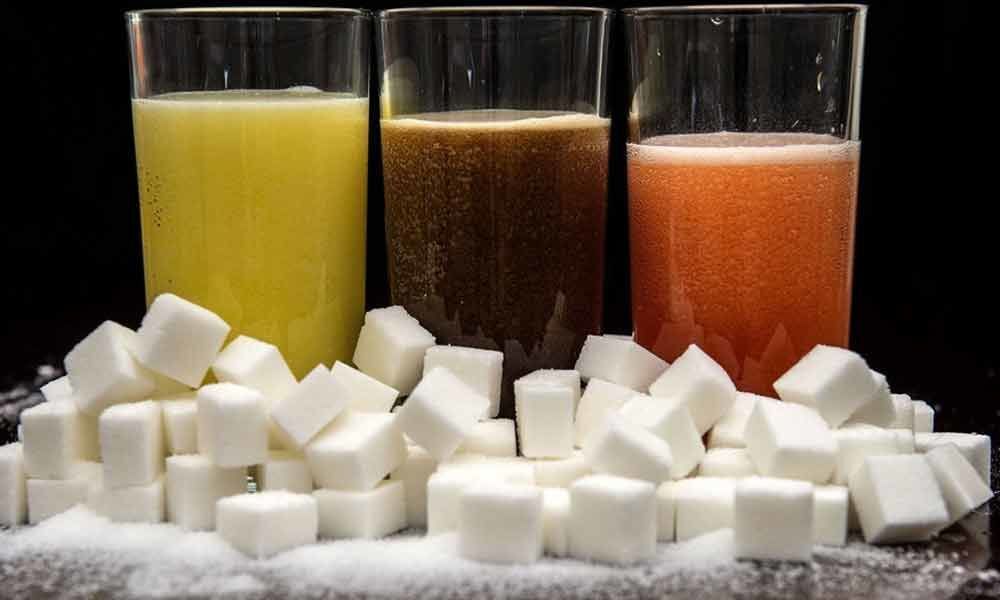Live
- Sukumar Hails Ram Charan's "National Award-Worthy" Performance in Shankar's 'Game Changer'
- CM Revanth Reddy to Hold Review Meeting with Senior Officials Today
- Pawan Kalyan's Visit to Penamaluru Constituency Today
- Kadapa Municipal Corporation Meeting: Heavy Police Deployment and Section 144 Imposed
- Mandhana, Renuka blow away Windies in first ODI
- Heavy rush for Bhavani Deeksha Viramana continues
- Steps taken to ensure accommodation to common devotees says TTD EO J Syamala Rao
- CRDA invites tenders for ‘Happy Nest’ township
- PD Act invoked against red sanders smuggler
- Meghalaya scrape past Goa to secure QF berth
Just In
Sugary drinks linked to increased cancer risk: Study


Higher consumption of sugary drinks may be associated with an increased risk of cancer, according to a study published in the British Medical Journal (BMJ).
London: Higher consumption of sugary drinks may be associated with an increased risk of cancer, according to a study published in the British Medical Journal (BMJ).
The findings add to a growing body of evidence indicating that limiting sugary drink consumption, together with taxation and marketing restrictions, might contribute to a reduction in cancer cases. The consumption of sugary drinks has increased worldwide during the last few decades and is convincingly associated with the risk of obesity, which in turn is recognised as a strong risk factor for many cancers, said researchers, including those from the University of Paris 13 in France.
However, research on sugary drinks and the risk of cancer is still limited. Researchers set out to assess the associations between the consumption of sugary drinks (sugar sweetened beverages and 100 per cent fruit juices), artificially sweetened (diet) beverages, and risk of overall cancer, as well as breast, prostate, and bowel (colorectal) cancers. The findings are based on 101,257 healthy French adults (21 per cent men; 79 per cent women) with an average age of 42 years. Participants completed at least two 24-hour online validated dietary questionnaires, designed to measure usual intake of 3,300 different food and beverage items and were followed up for a maximum of nine years. Daily consumption of sugary drinks and artificially sweetened (diet) beverages were calculated and first cases of cancer reported by participants were validated by medical records and linked with health insurance national databases.
Average daily consumption of sugary drinks was greater in men than in women. During follow-up 2,193 first cases of cancer were diagnosed and validated (693 breast cancers, 291 prostate cancers, and 166 colorectal cancers). Average age at cancer diagnosis was 59 years. The results show that a 100 millilitre per day increase in the consumption of sugary drinks was associated with an 18 per cent increased risk of overall cancer and a 22 per cent increased risk of breast cancer. When the group of sugary drinks was split into fruit juices and other sugary drinks, the consumption of both beverage types was associated with a higher risk of overall cancer.
No association was found for prostate and colorectal cancers, but numbers of cases were more limited for these cancer locations, researchers said. The consumption of artificially sweetened (diet) beverages was not associated with a risk of cancer, but the researchers warn that caution is needed in interpreting this finding owing to a relatively low consumption level in this sample. Possible explanations for these results include the effect of the sugar contained in sugary drinks on visceral fat (stored around vital organs such as the liver and pancreas), blood sugar levels, and inflammatory markers, all of which are linked to increased cancer risk.
Other chemical compounds, such as additives in some sodas might also play a role, they said. This is an observational study, so can't establish cause, and the researchers said they cannot rule out some misclassification of beverages or guarantee detection of every new cancer case. The study sample was large and they were able to adjust for a wide range of potentially influential factors. The results were also largely unchanged after further testing, suggesting that the findings withstand scrutiny.

© 2024 Hyderabad Media House Limited/The Hans India. All rights reserved. Powered by hocalwire.com






